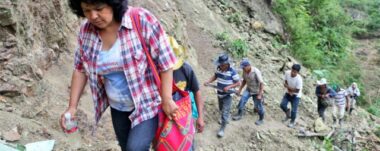How does the vote system work in Costa Rica?
Costa Rican Electoral System
Costa Rica’s electoral system has some peculiarities that differentiate it from other electoral systems. It is based on the Political Constitution, the Electoral Code and (as far as it is concerned) the Municipal Code for the establishment of its legal regulations. Elections in Costa Rica are supervised by the Supreme Electoral Tribunal, which has the constitutional rank of the fourth power of the State, that is to say, independent from the Executive, Legislative and Judicial branches, something that is not common in all countries.
In Costa Rica all Costa Rican citizens have the right to vote at the age of 18 or one year after naturalization in the case of foreigners. The vote is secret, universal and (at least theoretically) obligatory, although this obligatory nature is not implemented in practice. Women’s suffrage was approved in 1949 and current legislation requires that all positions within party structures and candidacies be divided equally between men and women.
Because all Costa Ricans have the right to vote, the Supreme Electoral Tribunal places voting stations in each and every district of the country, no matter how far away they are, including Cocos Island, as well as homes for the elderly, indigenous territories, penitentiary centers and in the country’s diplomatic headquarters outside its borders. It also takes certain measures so that people with disabilities can vote, such as assisted voting and special accessibility means.
A total of 61,668 nationalized foreigners are registered to vote legally in the elections, of which 50.5% are Nicaraguans and 13.1% Colombians. Also some 31,864 Costa Ricans living abroad are registered to vote from the respective embassy or consulate, since voting abroad was approved in 2010.
Characteristics of the vote
The Costa Rican vote is universal, which means that any Costa Rican citizen over 18 years of age or naturalized (12 months after obtaining the respective letter) can vote with the only requirement of presenting their identity card to the Receiving Board. The only situation in which a Costa Rican would be prevented from voting is if he/she acquires the age of majority or nationality once the electoral roll is defined and cannot be changed, which happens twelve months before the elections. There is, however, the possibility of losing the right to vote for very specific crimes such as treason, but since no one has been convicted of treason since the 1949 Constitution has ever been applied and there are no records of anyone ever losing the right to vote for any of the few cases where it is so stipulated. The legislation does establish that it is forbidden to enter the polling place under the influence of alcohol or drugs or armed.
The vote is also secret. It is forbidden, for example, to bring cell phones, cameras or recording or photographic objects to the ballot box in order to prevent the recording of the voting process. If a vote is made public, it is annulled. There are, however, exceptions to this rule, particularly in the case of persons with disabilities who are unable to vote for physical reasons. Here it is possible for the vote to be semi-public or assisted; the person may be accompanied to the ballot box, or totally public in which case he/she indicates to the receiving table for whom he/she wishes to vote.
The vote is direct, that is, all votes cast are counted for the direct election of the political authorities, without the mediation of second degree voting or similar.
Voting in Costa Rica is also mandatory, as established in Article 93 of the Constitution:
ARTICLE 93.- Suffrage is a primordial and obligatory civic function and is exercised before the Electoral Boards in direct and secret voting, by the citizens registered in the Civil Registry.16
However, in practice there is no sanction for not voting and in fact abstentionism is relatively high, normally oscillating around 30%.
Registration is automatic, that is, it is enough to be a Costa Rican citizen to be registered by default. As soon as a person receives his or her identity card, either upon reaching the age of majority or one year after naturalization, the Civil Registry, which depends on the TSE, registers the person in the census.
Although the registration is automatic, the person’s voting center will be designated according to the address of residence given at the time of obtaining the ID card. Therefore, if you change your residence, leave the country or are sentenced to prison, you must change your voting address in order to be able to vote.
General information
The Costa Rican electoral system is a variant of the proportional system where candidates for deputies and councilmen are elected from closed lists by quotient, subquotient and residue. Those parties with more than 50% of the votes are distributed the first seats proportionally to the percentages received. The remaining seats are distributed according to the votes obtained by subquotient and residue.
For the president and vice-presidents the absolute majority voting system is used, the candidate who obtains at least 40% of the valid votes cast wins, otherwise a second round of elections is called two months later between the two most voted candidates. This has happened three times; in the 2002 elections, in the 2014 elections and in the 2018 elections.
For mayors there are no second rounds or minimum percentages to win, applying in those cases the uninominal majority scrutiny system since it is enough for a mayoral candidate to obtain even one more vote than his most immediate contender to win.
Each polling place receives 500 registered voters, and there are as many polling places as necessary per district. They open at 6:00 a.m. and close at 6:00 p.m. on election day. The voter’s photo is the same as that of the identity card and must be signed by the voter unless for reasons of health or disability he/she is unable to do so. The cédula must be valid less than twelve months prior to the election.
The Electoral Apparatus
Supreme Electoral Tribunal
The Supreme Electoral Tribunal is the highest authority in electoral matters in the country and there is no appeal to its decisions in electoral matters. Even though the Supreme Court of Justice does have the power to regulate the TSE in matters of constitutionality as it has done, for example, establishing that the realization of a referendum for same sex unions that the TSE had given course was unconstitutional.
The main functions of the TSE are to supervise the elections, ensure compliance with the electoral laws, respond to claims of nullity, serve as arbiter to guarantee the equality of the actors and the purity of the vote, formally call the elections, declaring the beginning and end of the campaigns,18 announcing the results and declaring the winners.
It is made up of three magistrates whose number increases to five during election time, and from which the president of the TSE is elected. The magistrates are elected by the Judicial Branch.
Source: Wikipedia




